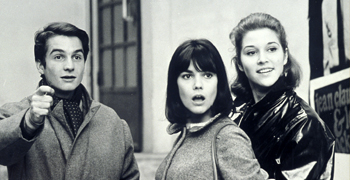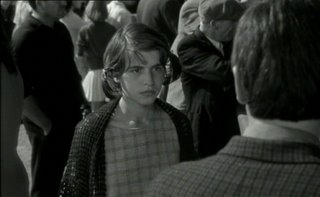 Willie Wonka (and/or Charlie) and the Chocolate Factory is puzzling in its politics. On the one hand, it is a sympathetic revenge story of class warfare: the bad guys (with the exception, perhaps, of Wonka) are almost uniformly from the ruling class, the good guy(s) (assuming there's a candidate besides Charlie) is from the working class. We root for Charlie, in part, because he's nice; in part, because he's an underdog; and very much in part because we have an unspoken conviction that all underdogs are basically good people and all top-dogs are at bottom bad ones. By rooting for Charlie, we root for good people who didn't get a fair shake, and by savoring, one little indian at a time, the Alighierishly delicious fates of each little rich boy, beauty queen, and spoiled brat, we delight in seeing our deep conviction that the game was fixed confirmed, and in seeing that fix turned against the winners. That is to say, the film's hooks and pleasures play on our resentment of social and economic inequality.
Willie Wonka (and/or Charlie) and the Chocolate Factory is puzzling in its politics. On the one hand, it is a sympathetic revenge story of class warfare: the bad guys (with the exception, perhaps, of Wonka) are almost uniformly from the ruling class, the good guy(s) (assuming there's a candidate besides Charlie) is from the working class. We root for Charlie, in part, because he's nice; in part, because he's an underdog; and very much in part because we have an unspoken conviction that all underdogs are basically good people and all top-dogs are at bottom bad ones. By rooting for Charlie, we root for good people who didn't get a fair shake, and by savoring, one little indian at a time, the Alighierishly delicious fates of each little rich boy, beauty queen, and spoiled brat, we delight in seeing our deep conviction that the game was fixed confirmed, and in seeing that fix turned against the winners. That is to say, the film's hooks and pleasures play on our resentment of social and economic inequality.At the same time, so much of the film directly deflates the hopes these hooks promote:
- The good little boy wins only by being selected as the favored symbolic son of the biggest capitalist in town--by being adopted, as it were, into the ruling class and by implication betraying his comrades.
- He inherits not only wealth but also a position of absolute authority over a microcosmic capitalist universe, complete with its own slave class: the Oompa Loompas. (Perhaps this means that Wonka's croneyism represents a critique of capitalism based in nostalgia for colonialism and non-economically based social hierarchies?)
- He wins by cheating, making painfully clear the injustice of the unequal punishment the other cheaters receive, made outrageously unjust with the additional reward of inheriting the factory and fortune.
- Even if we ignore the indications that Charlie is the shining good person in this weary world, the fact that he can get his due only through the voluntary charity of Wonka further refutes any progressive interpretation of its politics.
All of this amounts, in the end, to a strong suggestion of both the inevitability and moral necessity of class inequality. Little Charlie (and by implication, the entire working class) is every bit as greedy, selfish, and corruptible as the ruling class. He is happy to accept the trophy knowing he does not deserve it. He is even happy to accept it, knowing that Wonka knows he does not deserve it. These elements of the film encourage us, against the revolutionary emotions that underline its pleasures, to believe in the rightness of the system. We never imagine for an instant that, upon taking over the factory, Charlie will (or should!) change it in any significant way. We see that every individual, even within the ruling class, is wrong, only to emphasize more strongly the rightness of the economic system that controls him.
We might try to see this film as a coherently reactionary one: it seeks to make use of rebellious sentiments by turning them against us. But this is unconvincing. The film goes too much out of its way to insist upon its overt critique of its protagonists: the questionable ethics of Charlie and his grandfather, the hints of a dangerous degree of mental derangement in Wonka, and the sheer moral ugliness of both Wonka and grandpa's hypocritical self-righteousness during the big argument scene. This cannot be a film that actively seeks to make us sympathetic to Wonka, Charlie, or the factory, and a coherent reactionary message would have to do just that.
So, to get around this dilemma, I'm going to read it according to the only artistic model I can think of that shares this troubling ambivalence between progressive hope and reactionary despair: Franz Kafka. Specifically, the novels The Castle and The Trial.

In The Castle, an outsider arrives in a village, seeking entrance into the castle that stands in its center. He discovers he cannot stay in the village without the permission of the castle, and that he cannot get into the castle without the help of the villagers. The villagers, in turn, are sometimes unwilling, more often unable, to help him. During the course of the story, it becomes clear that they have no real knowledge of what goes on in the castle or how to gain entrance. While it represents the foundation that supports, and the authority that governs, the entire village, the castle does not directly interact in any way with the villagers--it may as well be empty, as far as anyone can tell.

However we wish to interpret The Castle, the principle theme is the utter break between village and castle; the lack of continuity, connection, or sense between its activity and that of the citizens--and the failure of the people to recognize or acknowledge this gap. This disconnect between authority and subject, law and individual, is also the inarguable interpretative foundation of the more famous novel The Trial. We might think of The Castle as a prequel of sorts to The Trial. The castle may or may not be inhabited; a valid political, social, and moral authority may or may not be discovered behind its gates; the unknown may or may not be filled out reasonably upon entrance to the site of the law. In The Trial, however, we begin to see what's inside, even if ultimately to discover that we have barely glimpsed through the gate. The protagonist of that work, a man arrested without charge and without apparent consequence, discovers that behind the door of the law there is an utter absence of order, structure, or authority.
The ambivalence of both stories is in how we are to interpret the misery of their protagonists. If the castle represents the ideal of what the law or justice ought to be, the measure according to which the village or the human system of justice fall short, then we might be inclined to see "K." (the hero of both stories) as an innocent victim bravely demanding that human justice measure up to that absolute standard.

If, however, the utter inaccessibility of the castle (or the utter absence of any higher authority in the absurdly perverse, corrupt, and amateurish legal system of The Trial) is meant to suggest that the law, or any valid authority upon which to ground it, is non-existent or completely unknowable, then our reaction must surely be different. K. may be a tragic hero, but he is not a victim (there is no one bad guy pulling the strings); his resistance is absurd (he holds humanity to an impossible or imaginary standard); and his goal of proving his innocence, his right to his place in the world, is equally absurd (there is no authority that can affirm his innocence or authorize his existence).
These interpretations have very opposed ethical and political implications. One suggests that the gap between true law and human law justifies rebellion against the present order. The other suggests that this gap exposes the impossibility--and thus irresponsibility--of such rebellion; the futility and even injustice of holding the human world to a fantasized standard of perfection. One makes the system guilty; the other affirms the guilt of those who resist it.
So how resolve this? One way is to understand Kafka's view as a rejection of both sides of the opposition. The human order neither embodies the law nor falls short of it. On the one hand, the system is unjust, but not in virtue of its failure to measure up to a non-existent standard, but because it portrays itself as the pure embodiment of such a standard. By telling its subjects that it is the law, it becomes illegitimate.
On the other hand, the attempt to replace the false law with the true one is a self-deception. There is no true law to replace it with. The law does not exist--or is, at least, absolutely uncertain. So, the proper response for K. is neither to accuse the law of injustice per se (to measure it according to "true" justice), nor to submit to it as the measure of justice (as those he encountered do and advise him to do). The proper response is to resist the system by rejecting the conception of true law, or true justice. This places Kafka at odds with both the status quo and with the classical revolutionary, who insists upon replacing the false order with a fantasized true one.
So, the solution to the Wonka puzzle:

 Wonka is not the big, bad capitalist pulling all the strings from behind the walls of his factory. He is not the figurehead of a false order to be overthrown by the workers in favor of a true one. Nor do we find, upon entrance into Wonka's castle, that he is the figure of true justice, the ideal which the outside world fails to meet (he is not, say, a temporary revolutionary dictatorship relinquishing his power to a dictatorship of the people). He does not, by punishing the brats and rewarding Charlie, right the wrongs they've done or suffered.
Wonka is not the big, bad capitalist pulling all the strings from behind the walls of his factory. He is not the figurehead of a false order to be overthrown by the workers in favor of a true one. Nor do we find, upon entrance into Wonka's castle, that he is the figure of true justice, the ideal which the outside world fails to meet (he is not, say, a temporary revolutionary dictatorship relinquishing his power to a dictatorship of the people). He does not, by punishing the brats and rewarding Charlie, right the wrongs they've done or suffered.But Wonka is also not a hypocrite or a diabolical character. His brutality towards the other children, and his choice of Charlie, are not entirely arbitrary. Wonka's character is positioned "beyond good and evil." When he puts these children to the test (on trial, let's say), he does so with awareness of the absence of the law--that is, with awareness that his own position of social and economic authority is contingent (he is not a believer in meritocratic capitalism). So he does not test them according to an assumed true moral standard (for if he did, Charlie would lose), but according to their willingness to recognize the gap between human law and true law.
Charlie wins because he is willing to break the law without claiming the authority to do so. He wins because he breaks the law for the sake of the law: because he steps beyond good and evil. The crucial difference between his own crime and the other childrens' is his absence of a sense of entitlement. The other children, on the contrary, break the rules out of a perceived right to do so. Like the revolutionary idealist, they claim to replace a false law with a true one (this is particularly well illustrated in Veruca Salt's case, since she explicitly appeals to a second figurehead of law, a "true" father, to justify her actions).
Charlie recognizes the injustice of both village and castle, and chooses to defy Wonka while acknowledging he has no higher authority to appeal to in this act of defiance. In doing so, he becomes Wonka's true heir: he makes the law rather than appeals to it, just as Wonka has done. This resolves the ambivalence, but leaves the ending very much open-ended. Charlie recognizes of the absence of the true law, and so he recognizes the falseness of human law's claims to embody the true law. This in turn explains his willingness to take up Wonka's position: he does not have a right to it, but neither does he violate anyone's right by taking it.

Yet it also reveals the dark implications of this realization. No higher law necessitates that Charlie expose the contingency of his authority. Everything suggests that he will, as Wonka has done, allow the people to continue deceiving themselves, to believe that he has a right to his place in the system, and that his authority is true. In other words, he will continue screwing over the other little Charlies and Oompa Loompas of the world.













































